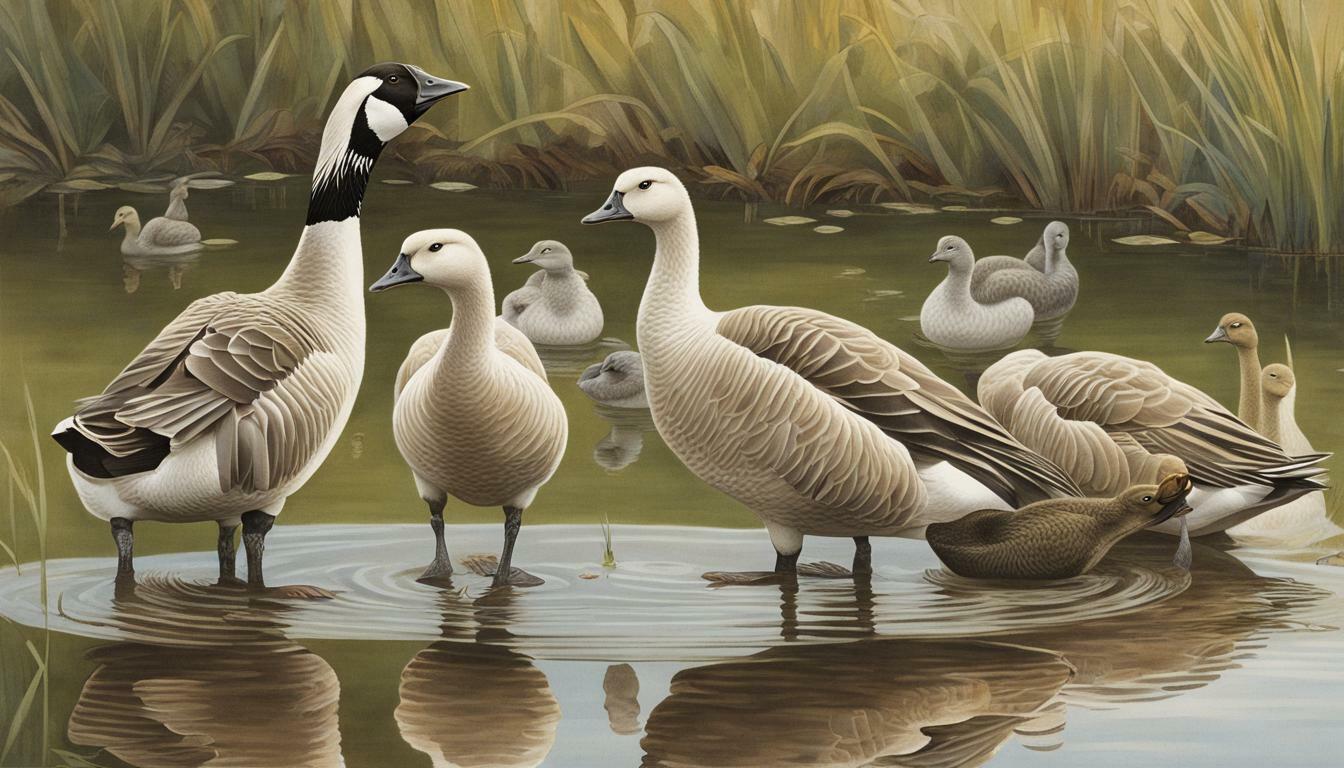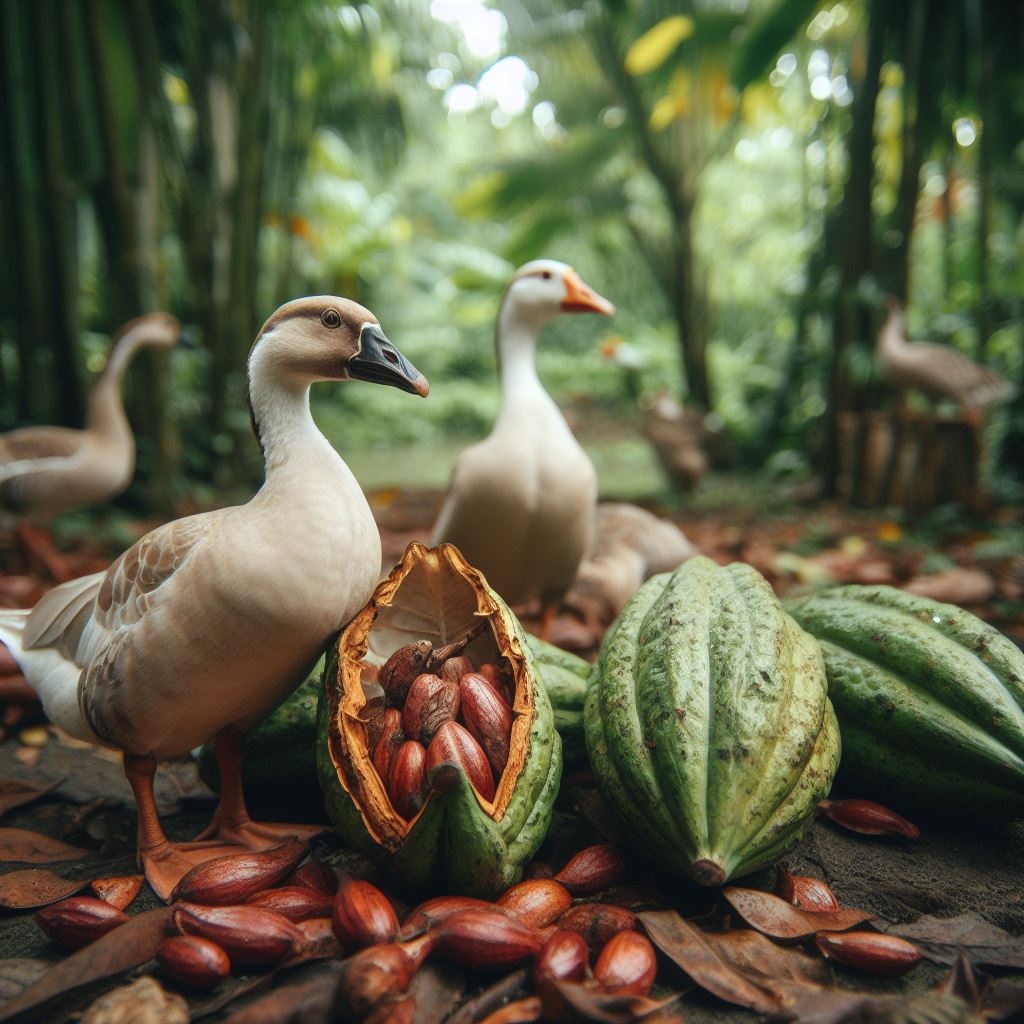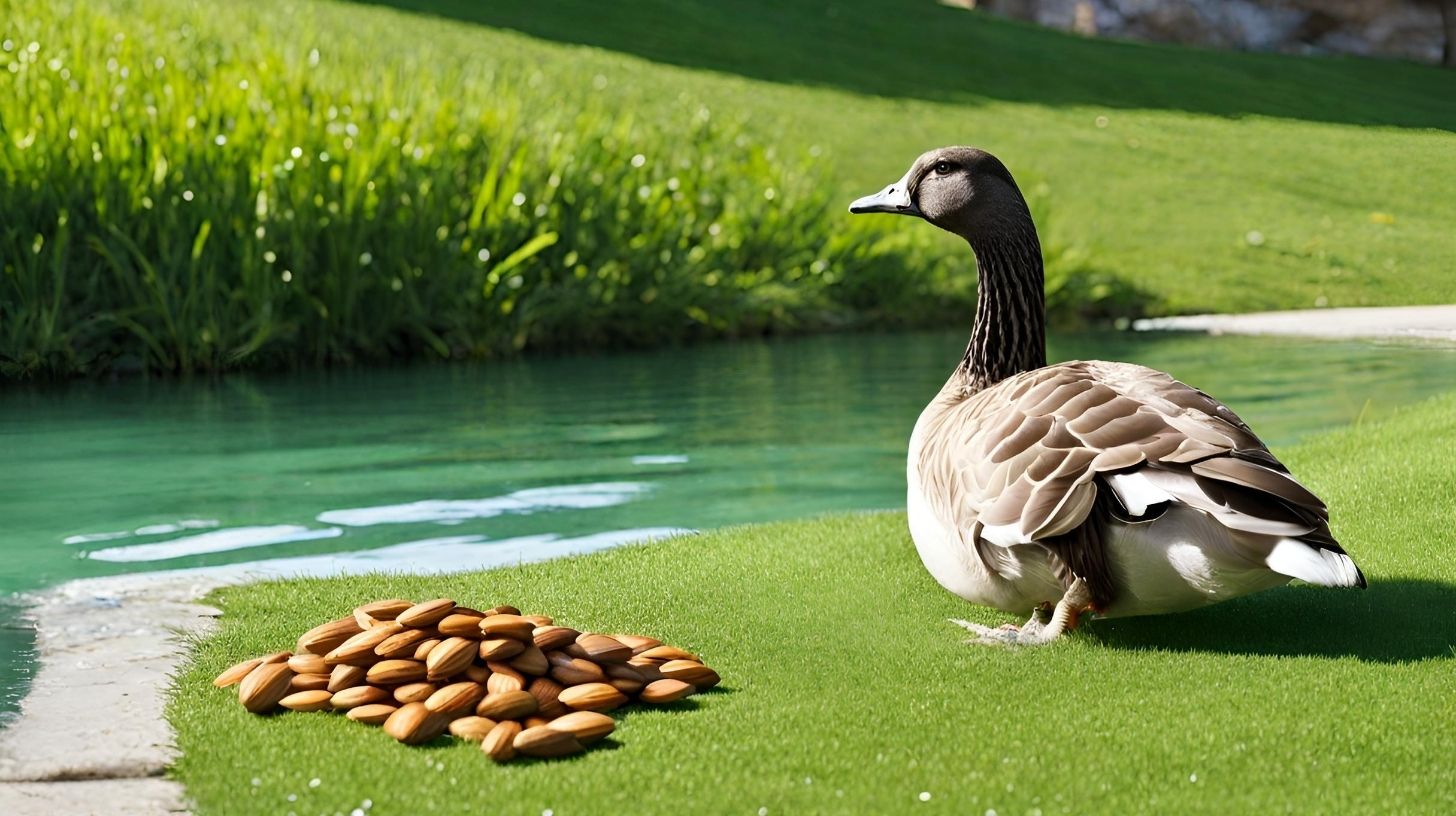Do Geese Eat Frogs? Dietary Habits of Geese!

Table of content:
- Why Geese Sometimes Eat Frogs
- How Geese Catch and Consume Frogs
- Frog Body Parts Geese Consume
- Types of Frogs Geese Prey On
- Do All Geese Species Eat Frogs?
- Impact on Frog Populations
- Do Geese Eat Tadpoles?
- Do Geese Eat Frog Eggs?
- Geese Hunting Frogs: Clever Predators
- Frog Defenses Against Geese
- Do Geese Specialize in Hunting Frogs?
- Environmental Factors That Increase Frog Eating
- Can Geese Digest Frog Toxins?
- Final Thoughts
Geese and frogs often share wetland habitats like ponds, lakes, streams and marshes. This leads many people to wonder – do geese eat frogs? The answer is yes, geese are known to eat frogs as part of their diverse diet.
Why Geese Sometimes Eat Frogs
Geese are omnivorous birds that feed on a variety of plant and animal matter. Frogs make up a small part of their diet. Here are some of the main reasons geese go after frogs:
- Opportunistic feeding – Geese eat whatever food sources are readily available. Since frogs share their habitat, geese will consume them.
- High protein – Frogs provide geese with high-protein food important for their health and growth.
- Feeding goslings – Adult geese feed newly hatched goslings small frogs and tadpoles which are easy for them to swallow.
- Varied diet – Eating frogs adds variation to a goose’s diet dominated by plant food like grass.
- Scavenging – Geese may scavenge already dead frogs they find in ponds and wetlands.
How Geese Catch and Consume Frogs
Geese employ a few hunting techniques to prey on frogs:
- Stalking – Geese will slowly walk through shallow water stalking for any movement. When a frog is spotted, they chase after it.
- Grabbing – Geese use their beak to grab any part of the frog they can latch onto – a leg, head or body. Their long necks allow them to reach into the water.
- Group hunting – Geese may work together to herd and corral frogs into shallow water to more easily grab them.
- Diving – On rare occasions, geese dive underwater to pursue swimming frogs. Their feathers are waterproofed to allow for brief dives.
Once caught, geese will violently shake the frog to kill it. They typically swallow frogs whole and alive. Geese use their muscular stomachs to digest the frog, bones and all.
Frog Body Parts Geese Consume
When a goose catches a frog, they ingest the entire animal. This includes:
- Legs
- Head
- Torso
- Organs
- Bones
The hard bones are easily crushed and dissolved by the grinding gizzard in a goose’s digestive system.
Geese do not selectively eat certain parts of a frog’s body. The legs tend to be the easiest part for a goose to grab onto and often what they catch first.
Types of Frogs Geese Prey On
Geese prey on a variety of frog species, mainly depending on what is available in their wetland habitat:
- Bullfrogs – Large bullfrogs are a perfect size meal for geese.
- Green frogs – Abundant near geese habitats, these frogs are frequently eaten.
- Leopard frogs – Medium-sized frogs geese can easily swallow.
- Tree frogs – Smaller frog species geese snap up from vegetation.
- Poisonous frogs – Geese appear unaffected by the toxins of brightly colored poison dart frogs.
- Aquatic frogs – Stream frogs, pond frogs and grass frogs are favored goose food.
Geese do not discriminate and will eat any frog they can capture and consume, regardless of species.
Do All Geese Species Eat Frogs?
The majority of goose species have been observed feeding on frogs, including:
- Canada geese – The most widespread goose in North America eats frogs.
- Snow geese – These Arctic nesting geese consume frogs on migration and wintering grounds.
- Ross’s geese – A tiny all-white goose that eats frogs of proportionate size.
- Greater white-fronted goose – Forages on frogs where available.
- Greylag goose – The ancestor of domestic geese eats the occasional frog.
- Egyptian goose – An African species that stalks and eats small frogs.
- Cape Barren goose – Australia’s only goose hunts small marsupial frogs.
However, a few goose species living in habitats without many frogs likely do not eat them often, if at all. For example, the high-Arctic nesting pink-footed goose rarely encounters frogs.
Overall, the consumption of frogs by geese appears to be an opportunistic feeding behavior practiced by most species.
Impact on Frog Populations
The occasional predation of frogs by geese likely has minimal impact on overall frog populations. Here’s why:
- Geese do not rely on frogs as a primary food source. Frogs make up a very small percentage of their diverse diet.
- Plentiful frog reproduction ensures there are ample numbers for geese to prey on without threatening the stability of the population.
- Wetland loss is a far greater threat to frog populations than occasional goose predation.
- Many other animals also prey on frogs, including fish, snakes, herons, and owls. Geese are just one of many frog predators.
Overall, the predator-prey relationship between geese and frogs is sustainable and part of a natural balance in wetland ecosystems.
Do Geese Eat Tadpoles?
Geese are also known to feed on tadpoles. Tadpoles make a nutritious, high-protein meal. Geese may eat tadpoles for many of the same reasons they eat adult frogs, especially:
- Easy for goslings to swallow
- Readily available food source
- For added protein
Geese stalk through shallow water looking for any movement of tadpoles. They grab them with their beak and swallow them whole and alive.
Tadpoles likely make up an even smaller portion of a goose’s diet than adult frogs. But geese will opportunistically take advantage of any easily caught food source like unsuspecting tadpoles.
Do Geese Eat Frog Eggs?
There is limited evidence that geese eat significant numbers of frog eggs. Here are some reasons why:
- Frog eggs are small in size and geese prefer larger food items.
- They are firmly attached to vegetation or debris which makes them harder to access.
- Eggs lack movement that attracts geese’s visual hunting.
- They are not as nutritious as tadpoles or adult frogs.
However, geese may occasionally ingest some frog eggs accidentally when feeding on aquatic plants. Overall, frog eggs seem to represent only a very minimal part of a goose’s diet if they eat them at all.
Geese Hunting Frogs: Clever Predators
Though geese are primarily herbivores, they are skilled opportunistic predators of small animals like frogs. Here are some of the clever hunting behaviors geese display when targeting frogs:
- Use their strong sense of sight to spot any frog movement.
- Employ stealthy stalking skills when approaching prey in water.
- Disturb frogs to purposefully flush them into the open.
- Work together cooperatively to corral frogs.
- Use their flexible long necks to rapidly grab prey.
- Hold frogs tightly in grip of tomium “teeth” on their beak.
- Violently subdue prey before swallowing.
- Hunt patiently and persistently until catching prey.
- Return to successful hunting spots.
This ability to opportunistically exploit a wide variety of food sources like frogs is key to geese thriving in diverse wetland environments.
Frog Defenses Against Geese
Frogs have some natural defenses against goose predators, but they are often unsuccessful:
- Camouflage – Frog’s mottled brown and green coloration lets them blend into surroundings. But geese’s excellent vision allows them to still detect frogs.
- Leaping evasively – Frogs are great hoppers, but geese can outrun them on land and outswim them.
- Burrowing in mud – Frogs will bury themselves in pond bottoms but geese can still grab exposed legs and heads.
- Toxic skin secretions – Poisonous frogs deter some predators, but these toxins do not seem to negatively affect geese.
- Inflating body – Some frogs inflate themselves with air to appear larger, but this does not stop geese from attacking them.
Overall, frogs have few defenses that provide them much protection from a determined, hungry goose. Their best strategy is to remain completely motionless and hope the goose does not notice them.
Do Geese Specialize in Hunting Frogs?
There are no known species of geese that specifically specialize in hunting frogs. All geese that eat frogs do so opportunistically as just a supplement to their mainly vegetation-based diet.
However, some individual geese may learn that prowling wetland areas yields a frequent frog meal. If a goose discovers a good frog hunting spot, they may specifically revisit it.
But no goose species has evolved specialized adaptations for catching frogs. They simply rely on their sharp eyesight, long neck, and stealthy stalking ability – which are mainly useful for their herbivorous lifestyle.
So while some geese certainly seem to enjoy frog hunting more than others, no species specializes in it. Frogs remain just a small part of a diverse goose diet.
Environmental Factors That Increase Frog Eating
Certain environmental conditions may cause geese to prey on more frogs:
Low Food Availability
When plants and grain crops are scarce, geese may turn to frogs for more protein. During migration or winter, geese may depend more on frogs when plant food is limited.
Ideal Frog Habitats
Geese eat more frogs in wetland areas ideal for large frog populations like overgrown ponds, marshes, swamps, and flooded fields.
Droughts
In drought years, small ponds and wetlands shrink leaving frogs more vulnerable to goose predation concentrated in smaller areas.
Gosling Rearing
Adult geese catch more frogs to feed protein-demanding fast-growing goslings in early summer.
So while geese eat frogs opportunistically, certain environmental factors can lead geese to target them more frequently as a supplementary food source.
Can Geese Digest Frog Toxins?
Remarkably, geese appear able to consume toxic poison dart frogs without ill effects. Their digestive systems may have special adaptations to break down the dangerous compounds.
Some possible explanations for how geese can tolerate frog toxins:
- Rapid digestion – Geese may pass the toxins through their system before being fully absorbed.
- High stomach acidity – The extra acidity may help dissolve poisons.
- Enzyme action – Geese may produce enzymes that counteract the frog poisons.
- Toxin dilution – The amount of toxins ingested from one frog gets diluted.
- Bacterial symbiosis – Helpful bacteria in the goose gut aid in detoxification.
Scientists still do not fully understand how geese can successfully eat brightly colored tropical poison dart frogs without apparent harm. More research is needed to uncover the secret behind this unusual ability.
Final Thoughts
While best known for grazing on grass, geese are actually highly opportunistic predators of small animals like frogs. Taking advantage of any abundant food source is key to their survival in diverse wetland environments. Though plants make up the bulk of their diet, geese seem to relish the occasional frog meal. Their skillful stalking and capture of frogs demonstrate the true predatory nature underlying their benign herbivorous image. So while fascinating to watch, it’s best not to be a small frog when a hungry goose comes sneaking through the reeds.
Welcome. I’m Adreena Shanum, the proud owner of this website, and I am incredibly passionate about animals, especially poultry. I founded adreenapets.com as a labor of love, stemming from my desire to share my knowledge and experiences with poultry enthusiasts worldwide.




